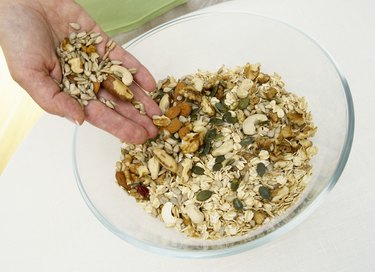
Constipation is a common digestive ailment that results when a person has infrequent or difficult bowel movements. Bowel movements vary between individuals; however, constipation is generally classified as having fewer than three bowel movements a week with excretions consisting of small, hard stools. Several factors may cause constipation including medications, diet, physical activity and intestinal dysfunction. In addition to consulting a physician, changes in dietary habits and lifestyle may help alleviate this condition to allow normal bowel movements.
Fiber
Video of the Day
Constipation may be the result of inadequate amounts of fiber in the diet. Fiber is the part of plant foods that is not digested or absorbed by the body. Rather, it passes through the body to be eliminated. Fiber helps regulate the digestive system by helping to move food through the digestive tract. It also adds bulk to stools for easier elimination through the rectum. Diets that are low in fiber, also referred to as roughage, may cause waste products and stool to move through the colon too slowly, resulting in constipation.
Video of the Day
Sources of Fiber
Fiber is found in complex carbohydrates, including whole-grain foods, as well as fruits and vegetables. Low-carb dieters who restrict carbs such as bread and cereals from their diet may experience digestive symptoms such as constipation. Bread and cereal, including granola, made from whole grains are a source of essential nutrients and fiber needed for normal body functions. As seen on ABC News Good Morning America, Dr. Marie Savard makes a high-fiber granola that is made of raw oats, ground flaxseed, wheat bran and seeds among other foods to help avoid and treat constipation.
Recommended Amounts
The American Heart Association recommends consuming approximately 25 grams of fiber daily. Eating foods that are high in fiber is often preferred to taking supplements as food offers a variety of other nutrients, vitamins and minerals. In addition to fruits and vegetables, add granola to your diet to achieve the recommended amounts. Serving sizes of granola vary and many store-bought types are high in fat or added sugars. Consider making your own at home and eat it with your breakfast cereal, as a snack over yogurt and berries or baked into whole-grain muffin mixes.
Moderation
It is important to increase your intake of fibrous foods such as granola slowly. Fibrous foods may actually cause constipation or other digestive complaints such as bloating or flatulence if it is introduced to quickly into the diet. Give your body time to get used to high-fiber foods such as raw oats and bran that add bulk to waste materials and fill you up quicker. Stick to small serving sizes of granola initially and avoid eating large amounts of it in one sitting. Drink plenty of fluids to help soften stools and help with the passage of stools.
Is this an emergency? If you are experiencing serious medical symptoms, please see the National Library of Medicine’s list of signs you need emergency medical attention or call 911.